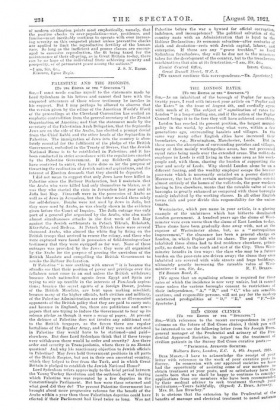THE LONDON RATES.
Pro THE EDITOR OF THE " SPECTATOR."1 SIR,—As an inhabitant of the borough of Poplar for nearly twenty years, I read with interest your article on " Poplar and the Rates" in the issue of August Gth, and cordially agree with much of it. The subject of " equalization of rates for London " is a long-standing one, and if the action of the Poplar Council brings it to the fore they will have achieved something.
London has reached its present position, the largest munici. pality in tho world, by absorbing what were, within a few generations ago, surrounding hamlets and villages. In the same way many other English cities have increased their boundaries, e.o., Birmingham, Manchester, Leeds. But in these cases the absorption of surrounding parishes and villages, many of them mainly working-class areas, has not prevented equal rates being made over the extended areas. The well-to-do employer in Leeds is still living in the same area as his work. people and, with them, sharing the burden of supporting the poor and needy of Leeds. Why should London alone be on a different footing, and the wealthy employer escape the heavier poor-rate which is necessarily entailed on a poorer district? Moreover, the fact that certain metropolitan boroughs consist almost entirely of the homes of the well-to-do, the poor workers having to live elsewhere, means that the rateable value of such boroughs is greatly enhanced as compared with those boroughs mainly inhabited by the working classes. In all other English towns rich and poor divide this responsibility for the unfor- tunate.
Westminster, which you name in your article, is a glaring example of the unfairness which has hitherto dominated London government. A hundred years ago the slums of West- minster were even worse than the slums of East London to-day. These slums have been gradually done away with, not at the expense of Westminster alone, but, as a " metropolitan improvement," the clearance has been a general charge on London, in which Poplar paid its share. The poor folk who inhabited these slums had to find residence elsewhere, princi- pally, no doubt, to the south and east of the City. Thus West- minster benefits in two ways : the class who may be a future burden on the poor-rate are driven away; the slums they once inhabited are covered with wide streets and huge buildings, ultimately greatly increasing the rateable value of West- [We agree that an equalizing scheme is required for those rates of which the incidence is now very unfair, but it cannot come unless the various boroughs consent to restrictions of their independence, " A," "B," and "C," who are sensible, cautious, and responsible persons, will not pay for the madcap unfettered prodigalities of " D," "E," and "F."—Ea Spectator.]


































 Previous page
Previous page